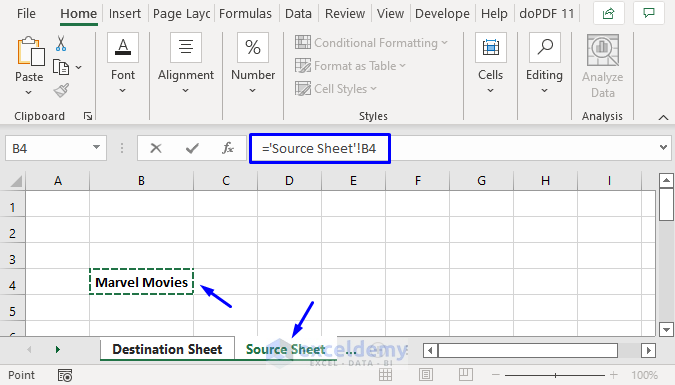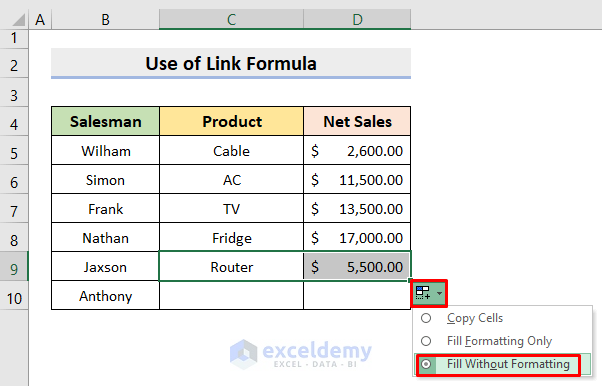Easily Link Text to Excel Sheets: Quick Guide

Linking text in your documents to Excel sheets can significantly streamline your workflow, especially if you frequently use both programs for data management, analysis, or reporting. This guide will walk you through the simple steps to create dynamic links between text and Excel data, enabling you to update your documents automatically when your spreadsheets change. Whether you're a business professional, an analyst, or a researcher, mastering this technique will save you time and reduce errors in your work.
Why Link Text to Excel?

Linking text to Excel sheets is not just about convenience; it’s about efficiency and accuracy. Here are some key benefits:
- Time Saving: Automatic updates mean you don’t have to manually enter data every time something changes.
- Accuracy: Minimize the risk of human error when transferring data.
- Dynamic Data: Reflects the latest changes in your spreadsheets instantly, which is crucial for time-sensitive reports or presentations.
- Scalability: Easily manage and integrate large datasets without manually updating every document.
Step-by-Step Guide to Linking Text to Excel

Let’s dive into how you can link text to your Excel sheets. Here’s a detailed walkthrough:
Setting Up Your Excel File

- Open the Excel file that contains the data you want to link.
- Ensure your data is structured in a way that you can reference cells easily. For example, if linking to a table, headers should be clear and the data should be organized.
- Save your Excel file. Remember, you’ll need the full path to this file when you’re linking from another application.
Linking from Microsoft Word

To link text to Excel from Microsoft Word:
- Open your Word document.
- Select the text or cell where you want to display the Excel data.
- Go to Insert on the Ribbon, click Object, then choose Create from File.
- In the dialog box, browse to your Excel file, check Link to File, and click OK.
- Now, when you update the Excel file, the linked data in your Word document will automatically reflect these changes.
Linking from Other Text Editors or Web Applications

If you’re not using Microsoft Office, here’s how you can link:
- Use the IFRAME or OBJECT tag in HTML to embed Excel files directly into web pages:
- Alternatively, you might need to export your Excel data as CSV or XML, then use software-specific methods to import this data into your document or text file.
📋 Note: When linking from other software, ensure compatibility with Excel file formats. Sometimes converting Excel files to a universal format like CSV might be necessary.
Advanced Tips and Troubleshooting

Updating Links Automatically

- Set your Excel file to automatically update when the document or web page is opened.
- Use macro or automation tools to refresh your links on opening or at specific times.
Handling Link Breakage

- Ensure your Excel file is accessible from the computer where the linking document is opened.
- Use relative file paths for documents on the same network or drive to avoid broken links when files are moved.
- Regularly check your links for validity to prevent errors in reports or presentations.
Security Considerations

Ensure your Excel files do not contain sensitive information when linking them to external documents or web applications, as this could pose a security risk.
Wrapping Up

The ability to link text to Excel sheets is a powerful tool for professionals who need to maintain up-to-date documents based on ever-changing data sets. By following the steps outlined in this guide, you’ve learned how to set up, manage, and troubleshoot these links effectively. The key points to remember include:
- Understanding why linking is beneficial for time-saving, accuracy, and data scalability.
- The straightforward methods to link from Microsoft Word and other applications.
- Advanced techniques for automatic updates, troubleshooting, and maintaining the security of your data.
Integrating these techniques into your workflow will not only make your life easier but will also enhance the professionalism and reliability of your reports, presentations, and analyses.
What happens if I change the location of my Excel file?

+
If you change the location of your Excel file, any document linked to it will break. Use relative file paths or update the links manually or through an automation tool.
Can I link to a specific cell range in Excel?

+
Yes, when linking from Microsoft Word, you can specify a particular cell range or named range in the Excel file to display in your document.
How do I ensure my links are secure?

+
Before linking, check for any sensitive data in your Excel sheets. Use secure file storage or share only what’s necessary, and always use proper permissions to prevent unauthorized access.
What alternatives exist if my software doesn’t support linking?

+
Export your Excel data to a text file format like CSV or XML, then import this data into your document or use automation scripts to update your text files periodically.



